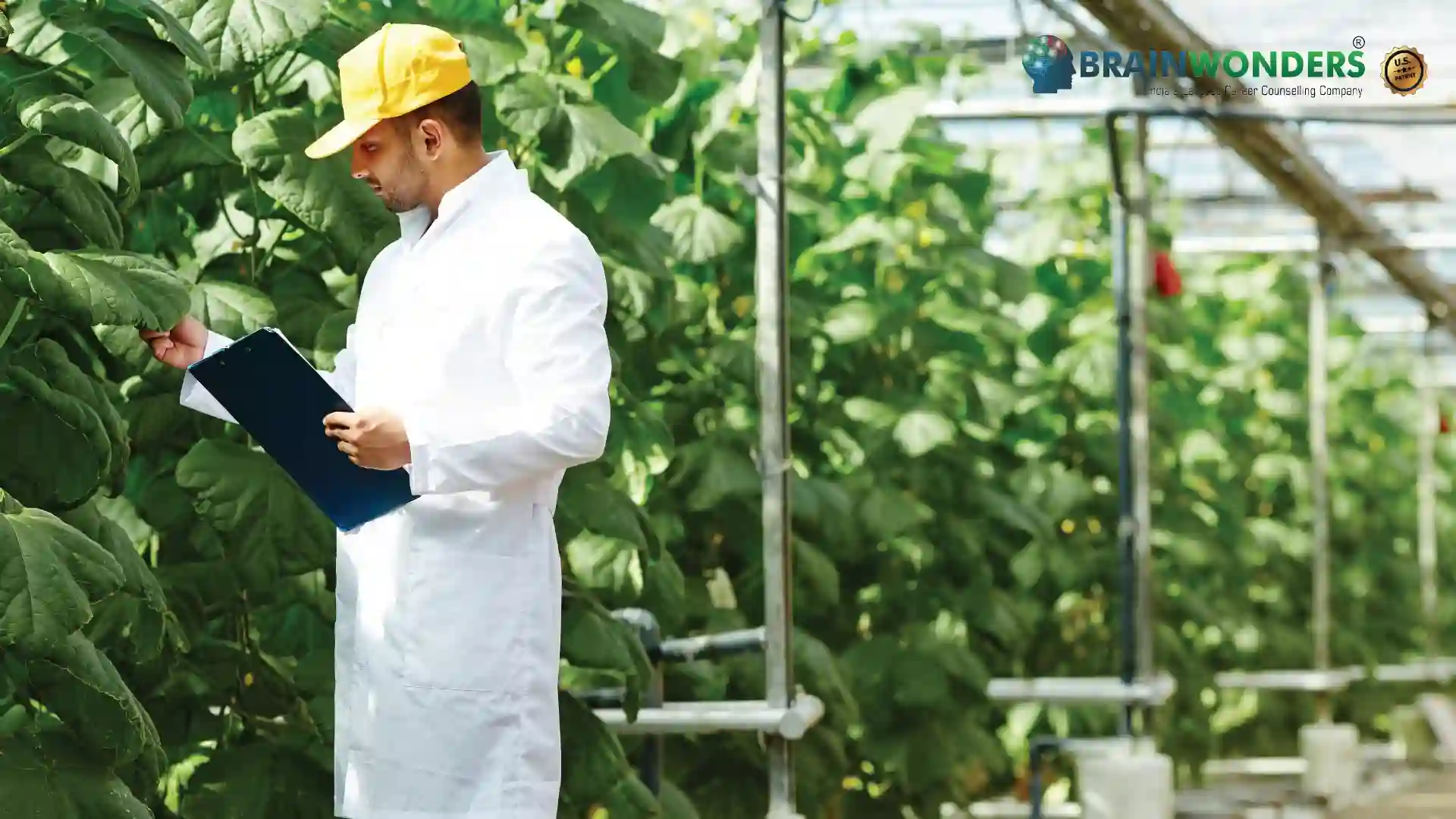Diploma in Agriculture - Course, Fees, Eligibility, Top Colleges, Top Careers
Course Description
All You Need to Know About a Diploma in Agriculture
The agriculture sector continues to serve as the backbone of India's economy, and the government is dedicated to modernizing it, thus creating more extensive opportunities for aspirants pursuing a Diploma in Agriculture. The government's focus is on enhancing agricultural inputs and fostering related research.
The Diploma in Agriculture is a program that offers candidates exposure to research and development in the field of agriculture.
Here are some essential details about the Diploma in Agriculture program:
The Diploma in Agriculture is a comprehensive agricultural study course at the undergraduate (UG) and postgraduate (PG) levels.
Students enrolled in this program gain theoretical and practical knowledge about various aspects of agriculture.
This course is designed for students interested in agricultural studies, providing insights into farming, harvesting, food production, fertilizer and pesticide composition, and more.
Candidates pursuing this diploma gain in-depth knowledge about various topics, including challenges faced by farmers, potential solutions, and strategies for improving the agricultural sector.
The Diploma in Agriculture offers various specializations, such as Food Processing, Seed Technology, Horticulture, Animal Husbandry, Poultry Farming, Organic Farming, and more. These specializations allow students to focus on specific areas of interest and expertise.
Embarking on a Diploma in Agriculture journey equips students with the necessary skills and understanding to contribute significantly to the ever-evolving agricultural landscape in India. As the government emphasizes modernization and research in this sector, diploma holders will likely find promising and rewarding career prospects in agriculture.
Why Choose a Diploma in Agriculture?
There are numerous compelling reasons to consider pursuing a Diploma in Agriculture. The nation seeks professionals with sound agricultural knowledge who can contribute to the betterment of farmers and the country's agricultural landscape. This course attracts students for the following key reasons:
- Abundance of Opportunities: The Diploma in Agriculture unlocks many opportunities, particularly within the agricultural sector. Upon completion, candidates can explore diverse fields like horticulture, pisciculture, agronomy, and agricultural economics. As the agriculture sector is projected to grow by 12% until 2026, there will be ample job prospects for Diploma holders in Agriculture.
- Early Career Advancement: Undertaking the UG diploma immediately after Class 10 enables students to pursue a specialized course at an early stage. This early start empowers them to gain valuable experience and practical skills before continuing their higher education. They can later pursue a degree program armed with a strong foundation of knowledge and expertise.
- Direct Job Opportunities: Completing the diploma course equips individuals to secure jobs directly in relevant agricultural fields based on their skills and knowledge.
- Competitive Salary: The course offers an attractive salary package, ranging from INR 2,00,000 to 10,00,000 or even higher. According to Payscale, agriculture specialists in India can earn around INR 558,000 per annum, making the diploma in agriculture one of the most financially rewarding courses in the country.
- MNC Job Prospects: The course opens doors to exciting career opportunities in top-notch companies. Renowned organizations such as ITC, Britannia, Godrej Agrovet, and Rallis India Limited actively seek Diploma holders in Agriculture. Moreover, pursuing higher education is another viable option for students.
- Research Opportunities: Aspirants of this course have the chance to engage in various agricultural research endeavours and explore related fields.
Typical day at work
Frequently Asked Questions
1. Which Diploma is best in agriculture?
Answer: The answer to this question depends on individual interests and career goals. Different diploma courses in agriculture offer specialized knowledge in various fields, such as horticulture, agronomy, animal husbandry, organic farming, and more. The best Diploma in agriculture would be the one that aligns with your specific interests and aspirations.
2. Is Diploma good in agriculture?
Answer: Yes, a Diploma in Agriculture can be beneficial for several reasons. It provides practical knowledge and skills in various agricultural aspects, making graduates well-prepared for careers in the agriculture sector. It opens up job opportunities in farming, agricultural management, research, and agribusiness areas. Moreover, it allows candidates to pursue higher studies or gain hands-on experience in the field.
3. Is a Diploma in agriculture good for the future?
Answer: Yes, a Diploma in Agriculture is considered valuable for the future. As agriculture continues to play a crucial role in economies worldwide, the demand for skilled professionals will likely remain high. With technological advancements and sustainable agriculture practices, diploma holders can contribute significantly to the industry's growth and development.
4. What is meant by Diploma in agriculture?
Answer: A Diploma in Agriculture is an educational program that offers specialized knowledge and practical training in various aspects of agriculture. It is typically offered at the undergraduate level and covers crop cultivation, soil science, plant breeding, agricultural economics, pest management, and more. The Diploma equips students with the skills needed to work in diverse roles within the agricultural sector.
5. Which stream is best for agriculture?
Answer: Several streams can lead to a successful career in agriculture. The choice depends on personal interests and preferences. Some popular agricultural streams include agricultural science, horticulture, agronomy, animal husbandry, agricultural engineering, and agricultural economics. Students can choose the stream that aligns with their passions and career objectives within the vast and rewarding field of agriculture.
Eligibilty
To enrol in the Diploma in Agriculture course, aspiring students must meet the following eligibility criteria:
- The candidate should have completed Class 10.
- A minimum aggregate score of 50% is required.
- Candidates belonging to SC/ST/OBC (non-creamy layer), differently-abled, and other eligible categories are eligible for a 5% mark relaxation.
However, if seeking admission through the entrance examination, the eligibility criteria slightly differ:
- Candidates with a minimum of 35% in their Class 10 board examination can appear for the entrance test.
- The candidates should have completed 15 years of education to be eligible for admission into the Diploma in Agriculture Course.
Admission Process for Diploma in Agriculture
-
Registration: Annually, colleges announce the registration dates in advance. Candidates need to register online by creating a profile. Those opting for admission through an entrance exam should register on the agency website, providing details like email id, phone number, etc., to receive a login ID.
-
Application Form: Log in to start the application process after creating a profile. Complete the application form, providing details of past educational achievements, job experiences, internships, and projects.
- Document Upload: Scan and upload essential documents, including mark sheets, photographs, signatures, and transfer certificates, through the online portal. Ensure that all documents adhere to the specified format and size requirements.
- Application Fee: Pay a minimal application fee using online payment methods. After making the payment, candidates should retain the receipt of the application form for future reference.
- Entrance Examination: Applicants must appear for the entrance examination and aim to score well.
- Admission Process: Colleges typically take a few weeks to process applications. If candidates meet the cut-off criteria and other requirements, they will receive an offer letter for admission. A list of qualified candidates is published for those applying through the entrance examination, and they can choose colleges through a counselling session.
How to Prepare for Diploma in Agriculture Entrance Exams?
When preparing for the Diploma in Agriculture entrance exams, candidates should keep the following points in mind:
- Syllabus: Thoroughly review the course syllabus and mark all the essential topics. Understanding the syllabus will guide your preparation effectively.
- Revise Important Topics: Focus on revising all the crucial topics from the syllabus. Solve practice questions related to these topics to reinforce your understanding.
- Practice Previous Year's Question Papers: Familiarize yourself with the exam pattern and question types by solving previous year's question papers. This will help you get accustomed to the format and improve your speed, as the exam is usually conducted online.
- Mock Tests: Take advantage of online mock tests available on official websites. Practising mock tests will enhance your efficiency, speed, and confidence for the exam.
How to Secure Admission to a Reputed Diploma in Agriculture College?
Securing admission into a top-ranked Diploma in Agriculture college requires attention to several key factors. Here are some helpful tips:
- Merit-Based Admission: Since many colleges admit students based on merit, aim for high academic percentages in your higher secondary schooling.
- Extracurricular Activities: Participation and certification in various extracurricular activities, such as clubs, sports, and voluntary work with NGOs, can strengthen your application.
- Entrance-Based Selection: For colleges with entrance-based selection, perform well in the entrance test and score above the qualifying marks to increase your chances of admission.
- Understand Exam Pattern: Be well-informed about the latest exam pattern, including section weightage, to tailor your preparation accordingly.
- Early Preparation: Prepare for the entrance exam at least a y
Colleges






